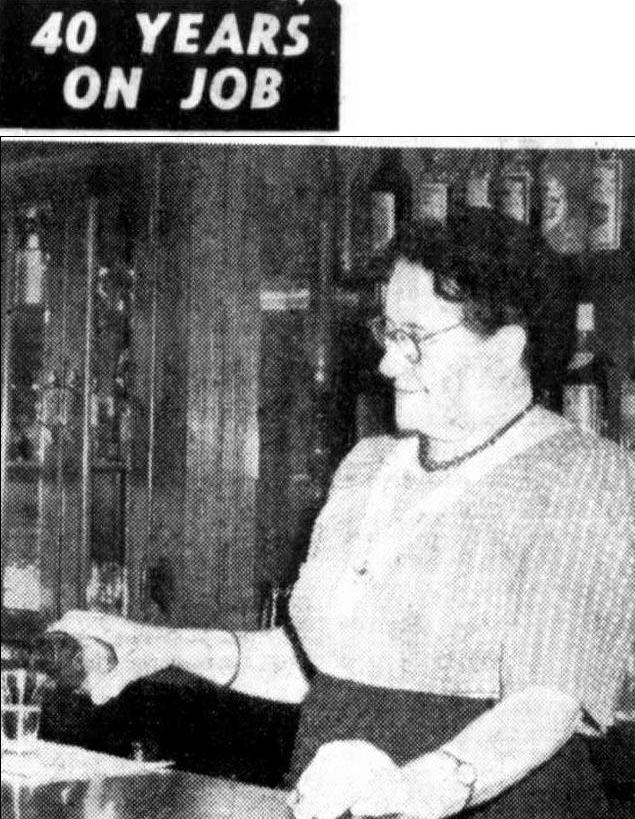-
What's On
- Events
- Exhibitions
- Tours
-
Kids and families
- Australian Rules Football in books
- Board games from the past
- Bugs and Insects
- Build a bug
- Create Futuristic Fashion that is Out of this world!
- Create your Ultimate Party Menu
- Design your Dream Holden
- Make your (book) mark at home
- Millie Mak the Maker
- Out on the Town with Keifee the Koala
- What's in Pig's Suitcase?
- Students and teachers
- Collections
- Research
- Stories
- Visit us
- About Us
- Get involved

"CITY'S LONE BARMAID
Forty years ago this week, Adelaide stopped registering barmaids. Only one is still on the job, Miss Lily Dear, of the Oriental Hotel Rundle Street
'No barmaids were registered after March 31, 1909. A licensee's wife and daughters over 21 are permitted to serve liquor in SA bars. Miss Dear ('Dearie' to workmates and customers) has been a barmaid for 40 years, the last 29 in the Oriental saloon bar. Today she said: 'A friend who urged me to take up the work said I'd never regret it. I don't think I have. 'Why have I stuck at it so long? Well, I like the customers and the wages are better than women get in most other jobs. 'I got £1 a week when I started. That was quite good money in those days.
'I don't drink and I let the customers do the talking. I listen. 'Another rule I learnt early was never to remember names or drinks. A regular customer entertaining friends doesn't always want it made obvious he is a regular. Miss Dear says men drink more whisky— when available —than they did 40 years ago. She also believes there was less drunkenness when bars were open until 11 p.m. instead of the present 6 p.m. closing. She enthusiastically supported Liquor Trades Union Federal secretary (Mr. F. Ryan), who, in a log of claims hearing in Sydney, said barmaids had to be more artistic than ordinary working women and should be paid £10/10/ a week.
Mr. Ryan told Conciliation Commissioner Morrison barmaids had to have 'personality plus', so they could attract customers. If a barmaid looked a 'frump' no publican would bother to employ her. Barmaids had to meet the constant expense of hair-do's and cosmetics. Mr. Ryan said in NSW barmaids were paid £4/16/6 a week and barmen £7. In Victoria both received £7/13/ a week. [Barmaids are not classified in the South Australian award]. Barmen in SA get £7/3/ a week."
The Mail, Saturday 2 April 1949, p12.

The Mail 2 April 1949, p12
From March 1909 until 1967 a woman was not allowed to serve in the public bar of a hotel in South Australia, unless she was directly related to the publican. If unrelated to the publican, the woman could only continue working behind the bar if she had been employed for at least three months prior to 23 December 1908, when the new Licensing Act was passed in Parliament. So, more correctly, even though Miss Dear is described as the last barmaid, other women were working the bar and indeed were licensees. Details about the process were reported in the Register 1 February, 1909.
The Oriental Hotel was established as the Suffolk Inn in 1840, it had a number of other names during its life as a licensed premises, including the Saracen's Head and the Hamburg Hotel 1847-1915. The name was changed to the Oriental in 1915 due to anti-German sentiment during World War One, and continued to trade under that name until 1966. The building in the photograph below dates from 1925 and was built on the site of the former, two-storey, Hamburg Hotel.
The building still exists and is called the Walsh Building after Herbert Walsh who held the license from 1915 until the closure of the hotel.
